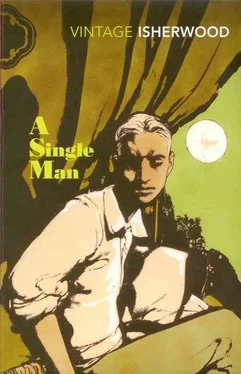Meanwhile, Ruskin has completely lost his wig. ‘Taste is the ONLY morality!’ he yells, wagging his finger at George. He is getting tiresome, so George cuts him off in mid-sentence by closing the book. Still sitting on the john, George looks out of the window.
The morning is quiet. Nearly all of the kids are in school; the Christmas vacation is still a couple of weeks away. (At the thought of Christmas, George feels a chill of desperation. Maybe he’ll do something drastic; take a plane to Mexico City and be drunk for a week and run wild around the bars. You won’t, and you never will, a voice says, coldly bored with him.)
Ah, here’s Benny, hammer in hand. He hunts among the trash-cans set out ready for collection on the sidewalk and drags out a broken bathroom weighing-machine. As George watches, Benny begins smashing it with his hammer, uttering cries as he does so; he is making believe that the machine is screaming with pain. And to think that Mrs Strunk, the proud mother of this creature, used to ask Jim, with shudders of disgust, how he could bear to touch those harmless baby king-snakes!
And now out comes Mrs Strunk on to her porch, just as Benny completes the murder of the weighing-machine and stands looking down at its scattered insides. ‘Put them back!’ she tells him. ‘Back in the can! Put them back, now! Back! Put them back! Back in the can!’ Her voice rises, falls, in a consciously sweet singsong. She never yells at her children. She has read all the psychology books. She knows that Benny is passing through his Aggressive Phase, right on schedule; it just couldn’t be more normal and healthy. She is well aware that she can be heard clear down the street. It is her right to be heard, for this is the Mothers’ Hour. When Benny finally drops some of the broken parts back into the trash-can, she singsongs ‘Attaboy!’ and goes back smiling into the house.
So Benny wanders off to interfere with three much smaller tots, two boys and a girl, who are trying to dig a hole on the vacant lot between the Strunks and the Garfeins. (Their two houses face the street frontally, wide-openly, in apt contrast to the sidewise privacy of George’s lair.)
On the vacant lot, under the huge old eucalyptus tree, Benny has taken over the digging. He strips off his windbreaker and tosses it to the little girl to hold; then he spits on his hands and picks up the spade. He is someone or other on TV, hunting for buried treasure. These tot-lives are nothing but a medley of such imitations. As soon as they can speak, they start trying to chant the singing commercials.
But now one of the boys – perhaps because Benny’s digging bores him in the same way that Mr Strunk’s scoutmasterish projects bore Benny – strolls off by himself, firing a carbide cannon. George has been over to see Mrs Strunk about this cannon, pleading with her to please explain to the boy’s mother that it is driving him slowly crazy. But Mrs Strunk has no intention of interfering with the anarchy of nature. Smiling evasively, she tells George, ‘ I never hear the noise children make – just as long as it’s a happy noise.’
Mrs Strunk’s hour and the power of motherhood will last until mid-afternoon, when the big boys and girls return from school. They arrive in mixed groups – from which nearly all of the boys break away at once, however, to take part in the masculine hour of the ball-playing. They shout loudly and harshly to each other, and kick and leap and catch with arrogant grace. When the ball lands in a yard, they trample flowers, scramble over rock-gardens, burst into patios without even a thought of apology. If a car ventures along the street, it must stop and wait until they are ready to let it through; they know their rights. And now the mothers must keep their tots indoors out of harm’s way. The girls sit out on the porches, giggling together. Their eyes are always on the boys, and they will do the weirdest things to attract their attention; for example, the Cody daughters keep fanning their ancient black poodle as though it were Cleopatra on the Nile. They are disregarded, nevertheless, even by their own boy friends: for this is not their hour. The only boys who will talk to them now are soft-spoken and gentle – like the Doctor’s pretty sissy son, who ties ribbons to the poodle’s curls.
And then, at length, the men will come home from their jobs. And it is their hour; and the ball-playing must stop. For Mr Strunk’s nerves have not been improved by trying all day long to sell that piece of real estate to a butterfly-brained rich widow, and Mr Garfein’s temper is uncertain after the tensions of his swimmingpool-installation company. They and their fellow-fathers can bear no more noise. (On Sundays, Mr Strunk will play ball with his sons; but this is just another of his physical education projects, polite and serious and no real fun.)
Every weekend there are parties. The teenagers are encouraged to go off and dance and pet with each other, even if they haven’t finished their homework; for the grown-ups need desperately to relax, unobserved. And now Mrs Strunk prepares salads with Mrs Garfein in the kitchen, and Mr Strunk gets the barbecue going on the patio, and Mr Garfein, crossing the vacant lot with a tray of bottles and a shaker, announces joyfully, in Marine Corps tones, ‘Martoonies coming up!’
And two, three hours later, after the cocktails and the guffaws, the quite astonishingly dirty stories, the more or less concealed pinching of other wives’ fannies, the steaks and the pie; while The Girls – as Mrs Strunk and the rest will continue to call themselves and each other if they live to be ninety – are washing up, you will hear Mr Strunk and his fellow-husbands laughing and talking on the porch, drinks in hands, with thickened speech. Their business problems are forgotten, now. And they are proud and glad. For even the least among them is a co-owner of the American Utopia, the kingdom of the good life upon earth – crudely aped by the Russians, hated by the Chinese – who are none the less ready to purge and starve themselves for generations, in the hopeless hope of inheriting it. Oh yes, indeed, Mr Strunk and Mr Garfein are proud of their kingdom. But why, then, are their voices like the voices of boys calling to each other as they explore a dark unknown cave, growing ever louder and louder, bolder and bolder? Do they know that they are afraid? No. But they are very afraid.
What are they afraid of?
They are afraid of what they know is somewhere in the darkness around them, of what may at any moment emerge into the undeniable light of their flashlamps, nevermore to be ignored, explained away. The fiend that won’t fit into their statistics, the gorgon that refuses their plastic surgery, the vampire drinking blood with tactless uncultured slurps, the bad-smelling beast that doesn’t use their deodorants, the unspeakable that insists, despite all their shushing, on speaking its name.
Among many other kinds of monster, George says, they are afraid of little me.
Mr Strunk, George supposes, tries to nail him down with a word. Queer , he doubtless growls. But, since this is after all the year nineteen sixty-two, even he may be expected to add, I don’t give a damn what he does just as long as he stays away from me. Even psychologists disagree as to the conclusions which may be reached about the Mr Strunks of this world, on the basis of such a remark. The fact remains that Mr Strunk himself, to judge from a photograph of him taken in football uniform at college, used to be what many would call a living doll.
But Mrs Strunk, George feels sure, takes leave to differ gently from her husband; for she is trained in the new tolerance, the technique of annihilation by blandness. Out comes her psychology book – bell and candle are no longer necessary. Reading from it in sweet singsong she proceeds to exorcise the unspeakable out of George. No reason for disgust, she intones, no cause for condemnation. Nothing here that is wilfully vicious. All is due to heredity, early environment (shame on those possessive mothers, those sex-segregated British schools!), arrested development at puberty, and/or glands. Here we have a misfit, debarred forever from the best things of life, to be pitied, not blamed. Some cases, caught young enough, may respond to therapy. As for the rest – ah, it’s so sad; especially when it happens, as let’s face it it does, to truly worthwhile people, people who might have had so much to offer. (Even when they are geniuses in spite of it, their masterpieces are invariably warped . ) So let us be understanding, shall we, and remember that, after all, there were the Greeks (though that was a bit different, because they were pagans rather than neurotics). Let us even go so far as to say that this kind of relationship can sometimes be almost beautiful – particularly if one of the parties is already dead; or, better yet, both.
Читать дальше












